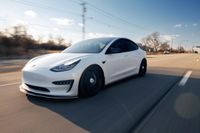Fewer Electric Vehicles Will Qualify for Federal Tax Credits in 2024
Efforts to fight global warming could suffer a setback next year when new rules reduce the number of electric cars that qualify for a federal tax credit.

New Rules Make Qualifying for Tax Credits More Difficult
Efforts to fight global warming could suffer a setback next year when new rules reduce the number of electric cars that qualify for a federal tax credit.
The credits, up to $7,500 a vehicle, have helped make electric cars more affordable, bringing the cost of some models below $30,000. Next year, for the first time, dealers will be able to give buyers the credit when they purchase a car, rather than telling them to claim it on their tax returns.
But qualifying for the subsidy will become more difficult on Jan. 1 because of Biden administration rules intended to encourage automakers to manufacture vehicles and parts in North America, while bypassing China. Most automakers are still years away from breaking their dependence on China for batteries and essential materials like refined lithium.
Electric Vehicle Sales Growth Slows Down
Electric vehicles are still the fastest-growing segment of the auto industry, and Americans have already bought more than one million this year. Sales will rise another 32 percent in 2024, according to BloombergNEF, compared to 47 percent in 2023. But Ford Motor, General Motors and Tesla have slowed investment as the pace of growth has cooled.
The list of fully electric vehicles that qualify for tax credits was already limited. Under rules that took effect this year, the credit was available only to cars manufactured in North America.
To collect the full credit, carmakers also must meet quotas on how much of their battery components and certain raw materials come from the United States or trade allies. Tesla, General Motors, Ford, Volkswagen, Rivian and Nissan are the only companies offering electric cars that qualify for the at least a partial credit. Some plug-in hybrid cars from Audi, BMW, Chrysler, Jeep and Lincoln also qualify for tax breaks.
New rules kicking in on Jan. 1 add another set of restrictions, disqualifying vehicles containing components made in China or made elsewhere by a firm under the control of the Chinese government.
Complexity and Confusion Surrounds Electric Vehicle Tax Credits
The stricter rules will disqualify Ford’s Mustang Mach-E, which has been eligible for half the credit and was the fourth-most-popular U.S. electric vehicle this year. Ford is still figuring out whether the F-150 Lighting, an electric pickup, will be eligible, a spokesman said.
General Motors said it is assessing whether its electric lineup, which includes the Chevrolet Bolt and an electric version of the Silverado pickup, will qualify. Nissan, whose electric Leaf is eligible for half of the $7,500 credit, did not respond to a request for comment. Rivian, whose electric pickups and S.U.V.s have qualified, also did not respond.
The lawmakers who drafted and passed the Inflation Reduction Act have said they wrote it to force carmakers to realign their supply chains. That is happening, but the changes will take some time to bear fruit.
The list of eligible vehicles could grow over the course of 2024 as carmakers ramp up U.S. production to qualify for the credits and other subsidies.
The Korean automaker Kia expects to begin producing the EV9, a seven-passenger electric sport utility vehicle, at a factory in Georgia next year. Those domestically assembled vehicles should be eligible for half the credit, or $3,750, a Kia spokesman said.
Stellantis, which owns Chrysler, Dodge, Ram and Jeep, plans to introduce six mass-market electric vehicles in 2024, including versions of the Dodge Charger, Jeep Wagoneer and Ram pickup. The company has not said whether the vehicles will qualify for credits.
Some hybrids, which have internal combustion engines and electric motors, will also qualify if they meet the sourcing requirements and have a battery with a capacity of at least seven kilowatt-hours.
Market forces are pushing down the prices of electric vehicles, a trend that is expected to continue as carmakers increase production. The average list price of an electric vehicle fell to $63,000 in November from $68,000 a year earlier, according to CarGurus. The average list price of a vehicle with an internal combustion engine was $48,000, the same as in the previous year.


